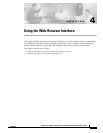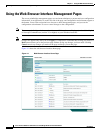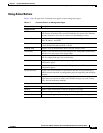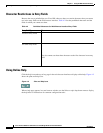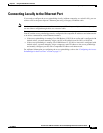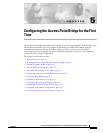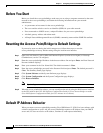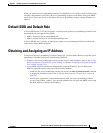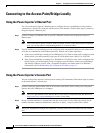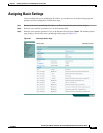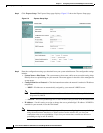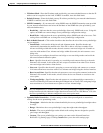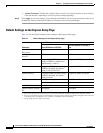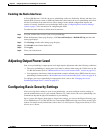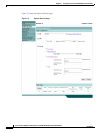
5-3
Cisco Aironet 1300 Series Outdoor Access Point/Bridge Hardware Installation Guide
OL-5048-02
Chapter 5 Configuring the Access Point/Bridge for the First Time
Default SSID and Default Role
When you connect an access point/bridge running Cisco IOS Release 12.2(15)JA or earlier software with
a default configuration to your LAN, the access point/bridge requests an IP address from your DHCP
server and, if it does not receive an IP address, the access point/bridge assigns a default IP address of
10.0.0.1.
Default SSID and Default Role
In Cisco IOS Release 12.3(2)JA2 and earlier, on initial power up the access point/bridge defaults to the
Install-Mode role and supports these SSIDs:
• SSID is autoinstall for the Install-Mode role.
• SSID is tsunami for Root AP and Workgroup Bridge roles.
In Cisco IOS Release 12.3(4)JA, on initial power up the access point/bridge defaults to the Root AP
mode and no default SSID configured.
Obtaining and Assigning an IP Address
To browse to the access point/bridge’s Express Setup page, you must either obtain or assign the access
point/bridge’s IP address using one of the following methods:
• Connect to the access point/bridge console port and assign a static IP address (refer to the “Using
the Power Injector’s Console Port” section on page 5-4 and the “Assigning an IP Address Using the
CLI” section on page 5-14).
• Use a DHCP server (if available) to automatically assign an IP address. You can find out the
DHCP-assigned IP address using one of the following methods:
–
Connect to the access point/bridge console port and use the show ip interface brief command
to display the IP address (refer to the “Using the Power Injector’s Console Port” section on
page 5-4).
–
Provide your organization’s network administrator with your access point/bridge’s Media
Access Control (MAC) address. Your network administrator will query the DHCP server using
the MAC address to identify the IP address.



